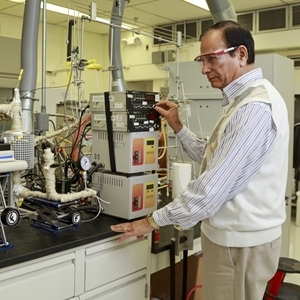DOE: Ethanol-to-hydrocarbon technology moves forward




Oak Ridge National Laboratory
December 18, 2015
BY U.S. Department of Energy
Oak Ridge National Laboratory published an article in Scientific Reports on its new method to directly convert biomass-derived ethanol to a hydrocarbon blendstock and is continuing work with Vertimass LLC to commercialize it.
The Energy Department’s Bioenergy Technologies Office provided funding for the Oak Ridge research beginning in 2011. Oak Ridge licensed the technology to Vertimass, which was awarded $2 million in BETO funding in 2014 to scale-up the technology. In 2015, Vertimass completed its technology validation, which was an independent, third party review that verified the baseline performance of the technology. Through the recent BETO award, Vertimass will continue to work with Oak Ridge and Technip, an engineering company, to develop the technical data need to commercialize this technology.
Advertisement
Advertisement
Oak Ridge’s research offers a method to co-produce both hydrocarbon biofuels and renewable chemicals from biomass-derived ethanol. Through direct catalytic conversion, the ethanol is used to produce a hydrocarbon blendstock that can be blended with petroleum at a refinery to produce biofuels such as drop-in hydrocarbon fuel, jet fuel, or diesel, or to produce renewable commodity chemicals such as BTX (benzene, toluene, and xylenes).
The Oak Ridge ethanol-to-hydrocarbon technology is significant because the ethanol industry has the capacity to produce more ethanol than can be currently absorbed by the market (a situation commonly referred to as the “blend-wall”), but processes to produce cost-competitive drop-in hydrocarbon fuel directly from biomass are still in development. Oak Ridge’s ethanol-to-hydrocarbon method could potentially expand the market for ethanol and enable production of drop-in hydrocarbon fuels more quickly, in addition to expanding production of jet fuel, diesel, and renewable commodity chemicals. In addition, Oak Ridge’s method would have lower operating costs and energy consumption than other possible processes to produce hydrocarbon products from ethanol, and the co-production of both fuels and chemicals could increase biorefinery profitability.
This BETO Conversion Program project is part of BETO’s overall efforts to accelerate the development of a sustainable, cost-competitive advanced biofuel industry that can strengthen U.S. energy security, environmental quality, and economic vitality, through research and development and market-based solutions in partnership with industry, academia, and national laboratory partners.
Advertisement
Advertisement
Related Stories
The U.S. Department of Energy Bioenergy Technologies Office (BETO) announced up to $23 million in funding to support research and development (R&D) of domestic chemicals and fuels from biomass and waste resources.
The U.S. DOE has announced its intent to issue funding to support high-impact research and development (R&D) projects in two priority areas: sustainable propane and renewable chemicals and algal system cultivation and preprocessing.
Sens. Sherrod Brown, D-Ohio, and Pete Ricketts, R-Neb., in August introduced the Renewable Chemicals Act, a bill that aims to create a tax credit to support the production of biobased chemicals.
The Chemical Catalysis for Bioenergy Consortium, a consortium of the U.S. DOE’s Bioenergy Technologies Office, has launched an effort that aims to gather community input on the development of new biomass processing facilities.
USDA on March 8 celebrated the second annual National Biobased Products Day, a celebration to raise public awareness of biobased products, their benefits and their contributions to the U.S. economy and rural communities.
Upcoming Events










